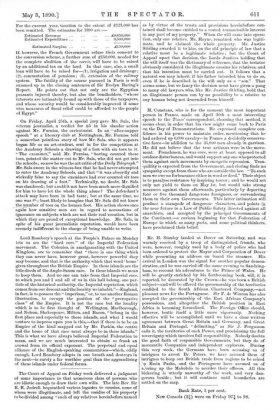M. Constans, who is for the moment the most important
person in France, made on April 30th a most interesting speech to the Times' correspondent, choosing that method, it seems clear, in order that his view might come back to Paris on the Day of Demonstrations. He expressed complete con- fidence in his power to maintain order, mentioning that he had ordered up 6,000 cavalry—in France a decidedly conserva- tive force—in addition to the 35,000 men already in garrison. He did not believe that the true artisans were in the move- ment. Frenchmen, he was sure, were at heart opposed to all outdoor disturbances, and would support any one who protected them against such movements by energetic repression. Tran- quillity is expected from the Government, and rioting finds no sympathy except from those who are outside the law. " To such men we owe no forbearance either in word or deed." Their object is to paralyse resistance by inspiring terror ; and he would not only not yield to them on May 1st, but would take strong measures against them afterwards, particularly by deporting four or five thousand dangerous foreigners, or surrendering them to their own Governments. This latter intimation will produce a stampede of dangerous characters, and points in the near future to a Law of Public Safety airected against all anarchists, and accepted by the principal Governments of the Continent,—a curious beginning for that Federation of Europe in which so many poets, and some political thinkers, have proclaimed their belief.






































 Previous page
Previous page